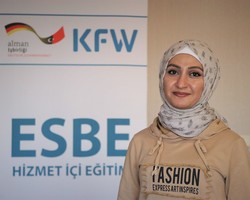The story of Havle: reaching out to Syrians in their homes

WHO/Celik Ozuduru
“The patients and their families are thrilled to have us. They always pray for us, which makes me very happy,” says Havle Fellah, member of the WHO Turkey Community Health Support Staff (CHSS) in Izmir.
“I joined the CHSS programme a year ago,” says 31-year-old Havle Fellah. “My day at the Refugee Health Training Centre starts with making arrangements for the day ahead in the morning. Then we visit our patients in the afternoon.”
CHSS pays home visits to Syrian patients who are not able to visit the Migrant Health Centre due to their advanced age or disability.
Havle goes on to explain how the home visits work. “When we step into a patient’s house, first we check the overall condition of the house and the mental health and well-being of the patient and his/her relatives, taking note of any health issues, and notify our doctors at the centre when necessary so that they can look into them.” Havle shares that pressure sores are the most common health problem for homebound patients and they were taught how to treat them. “These training opportunities help us greatly to the point that I feel very much empowered in what I do in my job,” she notes.
“During the visits we socialize with the patients and their family members who have no other opportunity to socialize. They don’t speak Turkish so they have a very limited social life,” Havle says and adds “I am humbled by this job. The patients and their families are thrilled to have us. They always pray for us, which makes me very happy.”
“With this job, I have become a member of a very supportive group. My colleagues encouraged me to go back to school. I listened to their advice. In the future, I want to work in the health sector.”
Havle recently attended a week-long training in Izmir on improving outreach to older or disabled patients. The training, held on 2 and 6 December 2019, was organized jointly by WHO and the Turkish Ministry of Health. It covered topics such as:
- communication skills and home visit steps
- communicable diseases
- healthy diet for home care patients
- hygiene and self-care
- patient mobilization and safety
- caring for patients with surgical wounds
- first aid.
About the Community Health Support Staff project
The Community Health Support Staff (CHSS) project supports the employment of Syrian personnel in the Turkish health sector. It acts as a bridge between patients and the Migrant Health Centres by having CHSS on the constant lookout for more complicated health issues that may require intervention by a doctor from the Refugee Health Training Centre.
As part of the programme CHSS can attend trainings on providing home care to the elderly and disabled, which are regularly offered by WHO. This gives employment opportunities to the participants and provides access to primary health care services to the patients.
The programme was launched in WHO’s seven Refugee Health Training Centres in 2018. As of January 2020, 279 CHSS members have been hired and 815 patients have benefited from home care services.
The project is run jointly by the World Health Organization and the Turkish Ministry of Health and funded by the German Government through KfW Development Bank.



